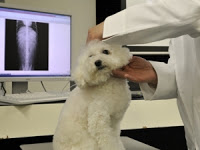The last post talked about diseases that can spread between animals and humans.
There are many diseases that both animals and humans get – although not necessarily from each other – such as breast cancer, Cushing’s disease and leukemia. Research and treatments shared between veterinary medicine and human medicine are producing good results for both people and animals.
- 80 to 90 percent of the drugs veterinarians used on animals were first developed for humans, according to Marty Becker of The Salem News. The drugs aren’t always used for exactly the same conditions. For example, Viagra is used in dogs to treat a heart condition. But other drugs – anti-anxiety medications – are prescribed for the same or similar conditions.
- A common surgery to remove tumors from the pituitary glands of humans is now available to dogs. Cedars-Sinai neurosurgeon Adam Mamelak, MD, taught the technique to some veterinarians in Los Angeles, saving the lives of nine dogs and one cat with Cushing’s disease. This condition is caused by the pituitary gland producing too much steroid cortisol, leading to weight gain, muscle shrinkage and high blood pressure.
- As an increasing number of dogs develop diabetes, veterinarians are using tools originated for humans to help treat them. One such tool is continuous glucose monitoring. This allows a vet to better understand how a dog’s body is responding to ordinary events in the dog’s home environment. This helps the vet prescribe more effective treatment.
- Veterinarian surgeons gave a tabby cat an artificial kneejoint after the cat survive cancer treatment. Vets and engineers have worked together on a number of innovative procedures, including surgery to give a cat artificial leg implants that fused with living bone tissue.
Consider how dogs help human medicine:
- University of Pennsylvania researchers have successfully used gene therapy to treat four dogs with a rare kind of blindness, retinitis pigmentosa. Their efforts may be a cause for hope in the many thousands of humans who suffer from this condition, according to the Philadelphia Inquirer.
- The National Cancer Institute’s Center for Cancer Research in Bethesda, MD, has created a consortium of 20 veterinary centers, overseen by veterinary oncologist Melissa Paoloni, DVM, to help speed the development of better therapies and approach to preventing and treating human cancers. Cancer is a leading cause of death for dogs. Because dogs age faster than humans, the results can be seen more quickly. Additionally, dog owners can opt for alternative approaches immediately; humans usually must exhaust all known approaches before turning to experimental options. The group has conducted 11 clinical trials. One study of sophisticated molecular profiling of tumors allowed vets to create personalized treatment plan for an individual dog within five days of the profiling.
- A Texas A & M University professor of veterinary surgery, has set up the Texas Veterinary Cancer Registry to connect the owners of pets with cancer and researchers because pets – especially dogs – are better predictors of the effectiveness of new cancer drugs and devices in people than mice. Dogs are much more susceptible to a variety of cancers that humans also get. Of the 77.5 million owned dogs in the United States, about a fourth will develop cancer. Owners are increasingly willing to spend the money to treat them – around $5,000 – but options are few.
